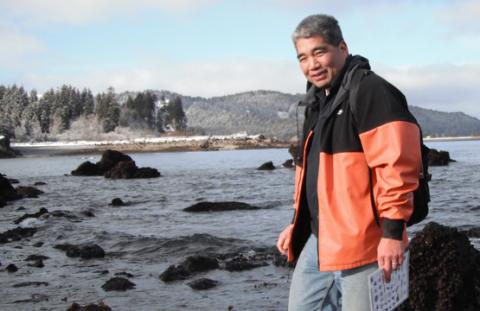
Monterey Bay Aquarium Research Institute
It all started long ago when my parents signed me up for a weekend trip to Anacapa Island (one of the California Channel Islands) with a fledgling organization called Guided Discoveries.
Education
- B.S., Marine Biology, University of California at Berkeley
- Ph.D., Biological Sciences, University of California at Los Angeles
Salary
$80,000 - $100,000
Contact
What is your current job and what does it entail?
I am a senior education and research specialist at the Monterey Bay Aquarium Research Institute in Moss Landing, California. This means I get the best of two worlds and work on a combination of research and education projects. I am interested in the open ocean and deep sea communities with particular emphasis on invertebrates. My specific areas of interest include the ecology and biogeography of open ocean and deep sea organisms; the functional morphology, natural history, and behavior of pelagic and benthic organisms; and the systematics and evolution of ctenophores and cnidarians (molecular phylogeny). You can see some of our current midwater research work on-line. I am very committed to education at the undergraduate and graduate level. I manage a number of different projects including our seminar program, our internship program, and joint activities with our sister institution, the Monterey Bay Aquarium.
What was the key factor in your career decision?
I wanted to be sure that I enjoyed my career and that it wasn't "work." It all started long ago when my parents signed me up for a weekend trip to Anacapa Island (one of the California Channel Islands) with a fledgling organization called Guided Discoveries. This was a weekend of firsts for many things: first time with snorkeling equipment, first time really seeing under the water, first time learning and appreciating the marine environment, and first time camping on a cold and windy plateau! Needless to say, this weekend was a strong influence as I began to develop a strong interest in the ocean (beyond a destination for tanning and bodysurfing). After majoring in marine biology at U.C. Berkeley, I decided to take a year off to think about my future and where I might be heading next (medical school, graduate school, no school?). I returned to the California Channel Islands, where I applied and was accepted as an instructor at the Catalina Island Marine Institute. My short stay at Toyon Bay (four months) was incredible and once again, Ross and Kristi Turner (and the rest of the staff) had a major impact on my life. I learned that I really loved teaching -- and that I really loved marine sciences (despite Ross's attempts to convert me to astronomy). I entered graduate school at UCLA and have been involved in research and education ever since.
What do like most about your career?
It's fun, exciting and ever-changing. There are always new developments, discoveries and challenges ahead of us and I don't see that ever changing. We know so little about the largest habitat on Earth!
What do you like least about your career?
I spend more time on the computer, behind my desk and at meetings that I would like. Otherwise, I can't think of anything that I don't like about my career.
What do you do to relax?
Play with my sons, talk with my wife, play beach volleyball, jog, read.
Who are your heroes/heroines?
My parents for their never ending patience and desire to provide me with whatever I needed to make my dreams come true (even when those dreams didn't match with their dreams for me!).
What advice would you give a student who expressed an interest in pursuing a career in your field?
There are some general topics that I would recommend. These would include English, typing, computer programming and debate. This would be in addition to the more typical courses that you are already planning on taking (sciences, engineering, etc.). In this day and age, familiarity with computers is essential for everyone. Although the program that you learn will likely be gone by the time you are out in the field, you will have learned the basics of programming and that won't change much. English and some sort of speech class will help you with your writing and presentation skills, something that we can all benefit from. One thing that is very important to recognize is that although there are lots of opportunities, you have to find them! Don't sit back and wait for somebody to tell you about something -- be proactive and search for opportunities in the field(s) that interest you. For example, I run a summer internship program and by the end of February we have already selected our interns for the summer. I still get lots of inquiries, sometimes as late as June, from students looking for summer positions.
Are career opportunities in your field increasing or decreasing and why?
Increasing fast! More and more research organizations are realizing the value of having an education specialist on staff. Also, there are some very exciting developments going on right now in the ocean sciences that will require more people in a wide variety of fields.
What will you be doing 10 years from today?
Hopefully, more of the same. We are on the edge of an incredible technological revolution in ocean science and I'm excited to be involved.

